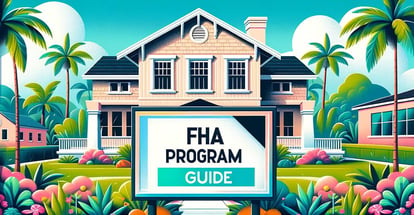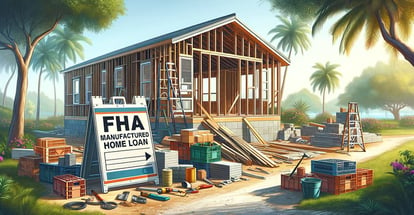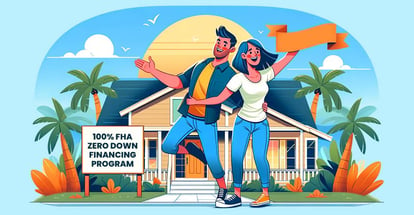Florida FHA Good Neighbor Next Door Program - FAQ and Changes in 2025
The Florida FHA Good Neighbor Next Door Program is a federal initiative designed to help certain community service professionals acquire homes at discounted prices.
Specifically, it aims to assist teachers, firefighters, emergency medical technicians, and law enforcement officers in becoming homeowners.
This FAQ section will address common questions about the program's eligibility criteria, benefits, and the application process, aiming to provide clear and actionable information.
Table of Contents
- What is the Florida FHA Good Neighbor Next Door program?
- Who is eligible for the Florida FHA Good Neighbor Next Door program?
- How to apply for the Florida FHA Good Neighbor Next Door program
- What types of properties are eligible for the program?
- What are the financing options for properties under the program?
- Can participants sell the property before the required occupancy period ends?
- Bottom Line
What is the Florida FHA Good Neighbor Next Door program?
The Florida FHA Good Neighbor Next Door program has a clear goal - to strengthen communities by helping important public workers like teachers and police officers own homes.
The program offers big discounts on the cost of homes to encourage these workers to live in areas where the average income is low to moderate. This helps make the community stronger and improves relations in the neighborhood.
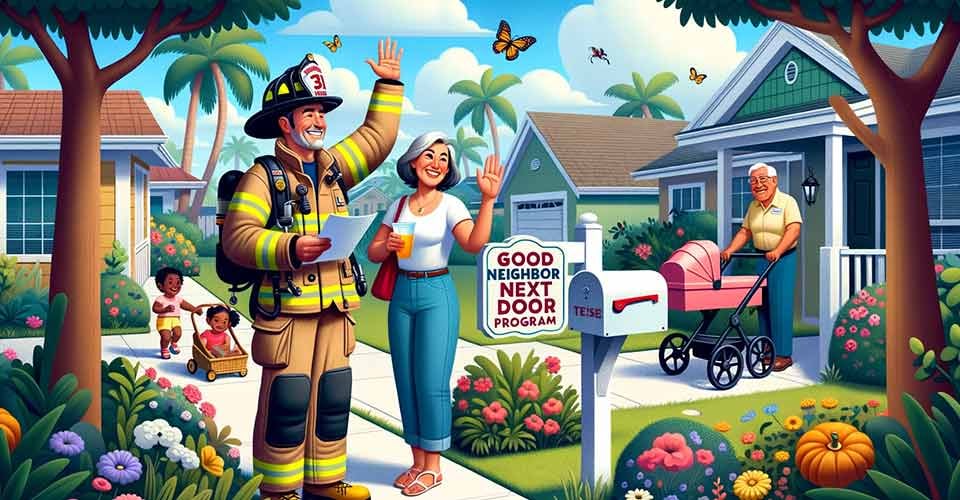
Program eligibility requirements
The Florida FHA Good Neighbor Next Door program supports community-enhancing professionals, including teachers, EMTs, firefighters, and law enforcement officers, in homeownership.
To qualify for the Florida FHA Good Neighbor Next Door program, you need to have a specific job. You must be a teacher from pre-K to 12th grade, a firefighter, an EMT, or a police officer. Your job must be your main way of making money, and you need to work close to the home you want to buy through this program.
You also have to live in the home you buy as your only residence for at least three years. This rule is in place to make sure the program helps the community like it's supposed to.
Lastly, you can't own any other homes when you accept the deal. This rule makes sure the program helps people who will really benefit from it.
How does the program work?
The Florida FHA Good Neighbor Next Door program operates on a lottery basis. Qualified applicants have a chance to win a home offered with a significant discount, leading to cheaper homeownership.
Applicants can register online by providing basic personal and occupational information to validate eligibility. Government-authorized housing agencies handle the pre-screening process to determine eligible candidates.
Homes sold under this program are located in revitalization areas, boost local economies and promote community development. It's a potent combo of affordable housing and community enrichment.
Every week, the HUD releases a list of available houses on its official website. Registered and qualified persons can then enter the lottery to potentially win these homes.
If selected in the draw, the participant can purchase the home by obtaining a mortgage loan, applying their savings, or using a combination of both. Participants must commit to live in the property as their primary residence for at least 36 months.
What are the benefits of participating in the program?
The Florida FHA Good Neighbor Next Door program can transform lives, offering tremendous cost savings on property acquisition.
This benefit translates into affordability for those in designated professions who might struggle to find housing within their community. Moreover, participants can reap the rewards of homeownership while investing in the community they serve.
In addition to financial gains, this program promotes integration and community engagement. Recipients are often local heroes - teachers, police officers, firefighters, and more, heavily involved in their communities. By living where they serve, they help build stronger, safer neighborhoods.
Good Neighbor Next Door program also features preferential selection for eligible properties. Buyers get the first option on HUD-owned homes in revitalization areas before these properties become available in the wider market. This gives them access to properties in neighborhoods where they work.
Aside from home ownership benefits, participants also have access to attractive financing options through FHA loans. Reduced down payment requirements and competitive interest rates can make buying a home more affordable than participants might have imagined.
Participants of the program also enjoy resale perks. After fulfilling the program's residency obligation, they retain all the equity in the home upon sale. Hence, it's not just about living comfortably in your community, but also financial planning for your future.
Who is eligible for the Florida FHA Good Neighbor Next Door program?
To be eligible for the Florida FHA Good Neighbor Next Door Program, you must have one of a few specific jobs - teacher, law enforcement officer, firefighter, or emergency medical technician. Each of these jobs has its own set of requirements that you must meet to qualify for the program.
Three main things are important for eligibility - your job, that the job is your full-time work, and that you plan to live in the home for at least three years. These rules are in place to make sure the program achieves its goal of helping communities.
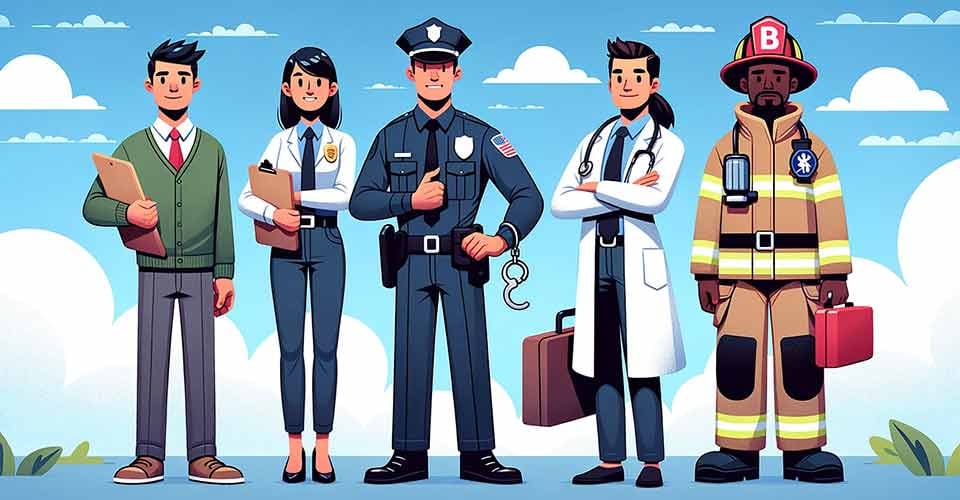
Qualifications for teachers
Teachers who wish to utilize the Florida FHA Good Neighbor Next Door Program have specific eligibility criteria they must meet.
-
Teachers must be employed full-time by a state-accredited public or private school that caters to students from pre-Kindergarten to 12th grade.
-
The school where the teacher is employed should be within the boundary of the home the teacher is planning to purchase through the program.
- A commitment to retain the property as their sole residence for at least three years is required.
Qualifications for law enforcement officers
Law enforcement officers eyeing the Florida FHA Good Neighbor Next Door program must meet defined eligibility criteria. Understanding these qualifications hurdles can help in successful application.
-
Be employed full-time as a law enforcement officer for a local, state, federal law enforcement agency.
-
Have a commitment to remain in the law enforcement officer position for at least one year.
-
Plan to occupy the home as their sole residence for at least 36 months.
- Homes must be located in designated revitalization areas.
Qualifications for firefighters and emergency medical technicians
Firefighters and Emergency Medical Technicians keen on securing a home under the Florida FHA Good Neighbor Next Door Program must meet specific criteria to qualify.
-
Hold a full-time employment status with a fire department or emergency medical services unit of the federal, state, county, municipal government, or an Indian tribal government.
-
Have the job location reasonably close to the property they plan to purchase using the program.
- Commit to living in the acquired property as their primary residence for at least 36 months.
Qualifications for other eligible participants
Other participants who can benefit from the Florida FHA Good Neighbor Next Door Program chiefly include military personnel. These folks must meet certain eligibility criteria which are distinct from their civilian counterparts.
-
Full-time military personnel.
-
Activated members of the National Guard and military reserves.
-
Surviving spouses of fallen service members who haven't remarried.
- Veterans honorably discharged.
How to apply for the Florida FHA Good Neighbor Next Door program
Applying for the Florida FHA Good Neighbor Next Door Program might seem hard at first, but it's easier if you know what to do.
It's important to understand each step, from turning in important papers to meeting all the rules of the program. Knowing what's needed at each stage can help you be more likely to get accepted into the program.
Step-by-step guide to the application process
Applying for the Florida FHA Good Neighbor Next Door program may seem complex, but you can navigate the process by following a step-by-step guide, breaking it down into manageable parts.
-
Check your eligibility - Confirm your status as a teacher, law enforcement officer, firefighter, or emergency medical technician in an approved area.
-
Identify a participating house - Locate an eligible single-family home, condo, or townhome in a revitalization area.
-
Submit your interest - Once an eligible property is located, express interest during the Lottery phase.
-
Application submission - If chosen in the Lottery, submit your formal application through an FHA-approved lender.
-
Closing the purchase - If approved, complete the purchase with the assistance of your real estate agent and lender.
- Occupy the property - Once the purchase is successful, occupy the residence for at least three years in compliance with the program's requirements.
What types of properties are eligible for the program?
The Florida FHA Good Neighbor Next Door program caters to a diverse range of eligible properties. This includes single-family homes, condos, and townhomes, providing potential buyers with vast options and flexibility.
The scope of property types permitted under this scheme helps cater to different lifestyle needs. Whether it's a cozy single-family home, a modern townhome, or a vibrant condo, all these homes qualify for the FHA Good Neighbor Next Door program.
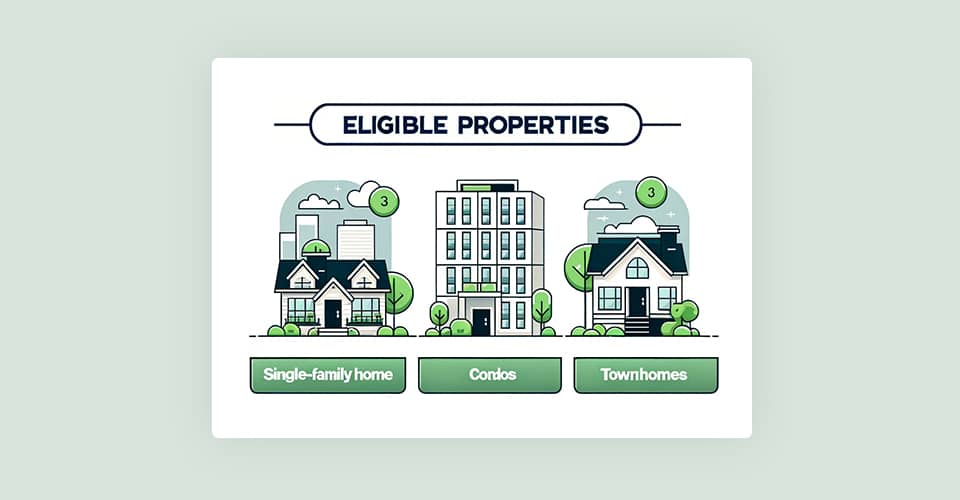
Single-family homes
Single-family homes are key components in the Florida FHA Good Neighbor Next Door Program. This niche is highly favored due to the tendency of these homes to foster stronger community bonds.
The inclusion of Single-family homes in the initiative underlines the program's focus on revitalizing communities. Purchasers contribute to this aim by promoting a safe, nurturing neighborhood environment.
Under the program, eligible single-family homes are typically located in areas deemed by the HUD as 'revitalization areas', enhancing their appeal to potential buyers and supporting the goal of community upliftment.
Barring select restrictions, owners have significant freedom with their property post-purchase. This liberty underpins the program's flexibility and its appeal to prospective homebuyers eyeing single-family homes.
Condos
In the Florida FHA Good Neighbor Next Door program, condominiums hold a notable position. Not every condominium is eligible; it must be FHA-approved, further ensuring quality and safety for recipients. Buyers must also comply with rules outlined by the condo association.
What sets condos apart in this scheme is the potential for lower maintenance needs compared to single-family units. This makes them attractive to participants looking for easier-to-manage properties.
The array of property options in the Good Neighbor Next Door program is tailored to be inclusive, accommodating the varying needs of eligible participants. Indeed, condominiums form a vital part of this spectrum, creating equal homeownership opportunities for program beneficiaries.
Townhomes
Townhomes are highly suited to the Florida FHA Good Neighbor Next Door Program. Occupants can benefit from the program's features while relishing the unique amenities and community-oriented living that townhomes offer.
The relevance of townhomes to the Florida FHA Good Neighbor Next Door program extends to both affordability and convenience. These properties offer prospective eligible buyers an opportunity to invest in a manageable, cost-effective home in targeted revitalization areas.
What are the financing options for properties under the program?
In the Florida FHA Good Neighbor Next Door program, prospective participants can claim property ownership using popular financing tools such as FHA loans and 203(k) rehabilitation loans.
The financing mechanism for the Florida FHA Good Neighbor Next Door Program is designed to accommodate a broad spectrum of prospective buyers, making homeownership more accessible and affordable for eligible participants.
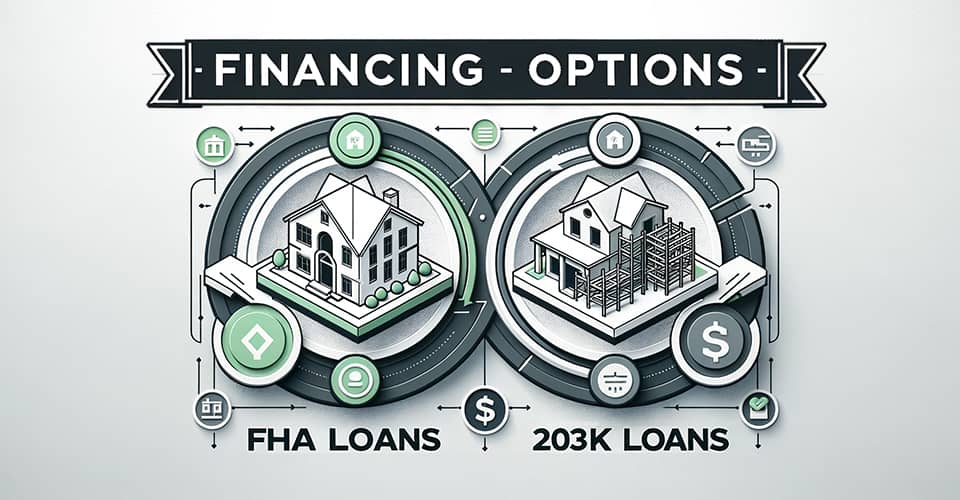
FHA loans
Utilizing FHA loans presents an efficient financing strategy for participants of Florida's Good Neighbor Next Door program. Low-interest rates and flexible eligibility criteria make these loans an attractive option for prospective homebuyers.
The dynamics of FHA loans within the program offer the potential for lower down payments, typically about 3.5% of the acquisition price. This convenience aids significantly in making home ownership more affordable.
Qualifying for an FHA loan requires applicants to fulfill specific requirements, such as steady employment, a sufficient credit score and an acceptable debt-to-income ratio. Reliable financial stability is essential.
The Florida FHA Good Neighbor Next Door program and FHA loans share a symbiotic relationship - this program's benefits are exponentially boosted by FHA loans' buyer-friendly conditions.
203(k) Rehabilitation loans
Participants in the Florida FHA Good Neighbor Next Door Program can use 203(k) Rehabilitation Loans. With these loans, home improvement funds are embedded into the homeowner's primary mortgage - a significant leap of faith in property renovation financing.
A 203(k) Rehabilitation Loan serves as an excellent finance tool under the FL FHA Good Neighbor Next Door Program. It covers not only the home's purchase price but also the cost of repairs and upgrades, providing a direct pathway to property investment.
Can participants sell the property before the required occupancy period ends?
Participants in the Florida FHA Good Neighbor Next Door Program cannot sell their property before the required occupancy period ends. This maintains the program's intention of fostering safe and flourishing communities.
-
Insights on Property Resale in the program - Selling before the set tenure leads to hefty penalties.
- Understanding Resale Terms - The bought property must be your primary residence for at least 36 months.
Bottom Line
The Florida FHA Good Neighbor Next Door program aims to help specific public workers, like teachers and police officers, own homes at a reduced cost. It focuses on strengthening communities by placing these professionals in areas with low to average incomes.
To be eligible, you must have a certain job, it must be your full-time work, and you have to live in the home you buy for at least three years.
The program offers a variety of home types, from single-family homes to condos and townhomes, in designated revitalization areas.
Financial options like FHA loans and 203(k) rehabilitation loans make the program even more accessible. However, you can't sell the property before living in it for the required three years.
This comprehensive guide has provided you with key details about eligibility, the application process, property types, financing options, and terms on selling the property.
With over 50 years of mortgage industry experience, we are here to help you achieve the American dream of owning a home. We strive to provide the best education before, during, and after you buy a home. Our advice is based on experience with Phil Ganz and Team closing over One billion dollars and helping countless families.

About Author - Phil Ganz
Phil Ganz has over 20+ years of experience in the residential financing space. With over a billion dollars of funded loans, Phil helps homebuyers configure the perfect mortgage plan. Whether it's your first home, a complex multiple-property purchase, or anything in between, Phil has the experience to help you achieve your goals.


 By
By  Edited by
Edited by 




